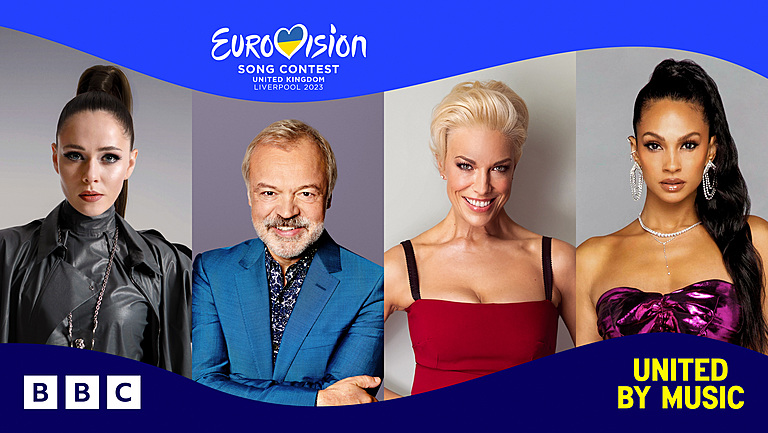Two decades have passed since Martin Isherwood wrote the UK’s 2003 Eurovision entry, Cry Baby, with support from his colleague, musician Mel Purves. Now, with less than a month to go until Eurovision 2023 takes place in Liverpool, Isherwood and Purves reflect on their experience in the Eurovision maelstrom.
“One night I dreamt that we got nul points,” says Isherwood. “I had begged for the singers to be given monitors so they could hear well, but once we got the song through, it was as though we were set up to fail. I just knew we would.”

Martin Isherwood. Credit: Martin Isherwood.
Isherwood, who has been head of music at the Liverpool Institute for Performing Arts (LIPA) since 2001, wrote Cry Baby for singers Chris Cromby and Gemma Abbey. After endless amounts of tweaking, the song made it through the BBC’s Song for Europe before being chosen as the song to go to Eurovision. “That felt amazing,” says Isherwood. “The press were full of the big build-up and it was so exciting. Mae will be feeling the same anticipation.”
The UK’s 2023 Eurovision entry is I Wrote A Song, a track by 25-year-old Mae Muller. “The chorus of Mae’s song is catchy and has a Latin feel with flavours of Madonna’s La Isla Bonita and Camilla Cabello, Dua Lipa, and even a hint of Jennifer Lopez,” says Isherwood.
Both Isherwood and Purves are backing Muller for the win, but are circumspect in terms of how Eurovision has changed since their day.
“Don’t forget that in 2003 it was all a public vote,” says Isherwood. “And the other thing to remember was that 24/25 countries were voting in 2003 but now there’s around 50 voting. That’s 7,000 more points in the pot just like that.”
He adds: “The performers [in 2003] Chris and Gemma were great but were not used to performing in such a vast venue and I repeatedly asked for them to have monitors so they could hear the track. Poor Gemma had to take a total stab in the dark and get the song out there whilst not hearing anything. It is all so political.
“We were never taken around Europe which is something you have to do. The management did not have the money for that. You have to do the groundwork and that didn’t happen for us.”

Mel Purves. Credit: Mel Purves.
Isherwood and Purves met while studying for music degrees at the University of Salford. They have since gone on to work with some of the biggest stage shows and artists in the world. Despite their enthusiasm for Eurovision, there’s no getting away from what happened to them in 2003.
On the evening itself, Purves flew to Latvia to support Chris and Jemma. But she was powerless to help the live performance. “The arena was huge, poor Chris and Jemma could not even hear the track as they performed,” she says. “They had played gigs but nothing like this scale and it all just seemed so unfair to be given nul points.”
Isherwood adds: “I went from being hailed a superstar for getting the song through to the final to being public enemy number one. I was chased around by film crews, called by aggressive reporters at midnight, and totally slagged off. Poor Chris and Jemma were treated dreadfully after that by the media. I hope that 20 years on, Mae will get support whatever the score. And I hope she is given any monitors she may need.”
Eurovision past and present
Purves reflects on the 2022 Spanish entry where Cuban artist Chanel performed SloMo wearing a seductive glittery leotard and chaps. “There is no doubt Eurovision is trying to attract a younger audience,” she says. “Over the last 20 years, the notion of sexier has gone into territories that were previously unchartered unless you were into a burlesque or a gentleman’s club. Fashions have changed. If you want to have publicity and a stage presence, people have to push it. Everyone wants to stand out.”
Isherwood agrees. “Swearing on TV is commonplace now, especially on chat shows. People want to stand out. Pop video has always been sexy though. Think back to the Pussycat Dolls, and Madonna with Erotica. But with music performance and Eurovision, the performances have become like a circus. Why can’t we just make it about the song? After all, it is a song contest.”

Mae Muller will represent the UK this year with her song ‘I Wrote A Song’. Credit: BBC/Harry Carr/Capitol/EMI.
Tickets to watch this year’s event at the M&S Bank Arena Liverpool have sold out. Purves believes that the international media spotlight will shine on the talented musicians emerging from the Northern music scene.
“It is so refreshing to have such a global music event held in the North,” she says. “For years we’ve seen events happen in London and there’s been way too much privilege in the music industry. I hope that is changing now.”
Isherwood predicts that there will be more media focus on the North following Eurovision.
“It’s great for not only Liverpool but also the North. Liverpool is the world capital of pop. It would be good to see the BBC use local talent throughout this year and that includes local presenters. It’s all about community. We have some incredible creative talents in the North – music, art, you name it.”
Purves adds: “This year is a great opportunity for the Northern Powerhouse to collate and show off creative musical talents. It is so good to finally see a spotlight on the Northern music scene.”
By Leigh Purves
Main image: Julia Sanina, Graham Norton, Hannah Waddingham and Alesha Dixon. Credit: BBC/Natalia Ivanova/Ray Burmiston/Darren Bell/Guy Levy.








